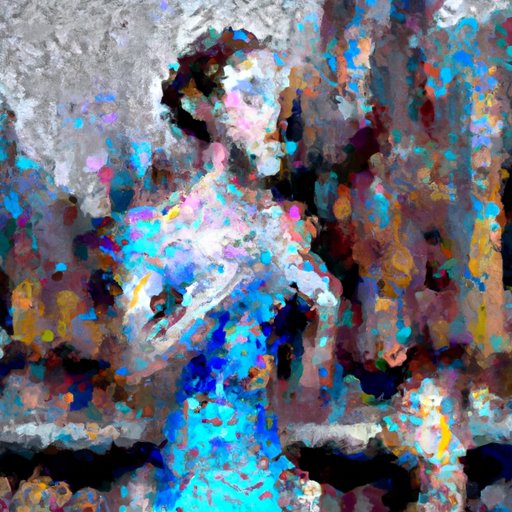Introduction
As technology continues to advance, it is becoming increasingly difficult to distinguish between what is created by humans and what is created by machines. One area where this is particularly evident is in the realm of art. As artificial intelligence (AI) becomes more sophisticated, the question arises: can AI create art? In this article, we will explore the possibilities of AI creating art, examining the impact of AI on creativity and artistic expression, and looking at the debate over human vs. machine-generated art. We will also consider what the future may hold for AI and art.
Examining the Impact of AI on Creativity and Artistic Expression
The emergence of AI has had a profound impact on creativity and artistic expression. AI has been used to create everything from music to paintings, sculptures, and beyond. But how does AI compare to human creativity? According to Dr. David Cope, professor emeritus of music at the University of California Santa Cruz, “The difference between machine-generated art and human-generated art is that machines are not capable of making creative decisions.”
However, AI is not only being used to create art; it is also being used as a tool to enhance human creativity. AI can be used to assist artists in the creative process, providing them with ideas, helping them to refine their work, and even allowing them to collaborate with machines. For example, Google’s Magenta project uses AI to generate new musical compositions, while Adobe’s Project VoCo allows users to edit audio recordings using AI-generated voice recognition.
AI is also playing an increasingly important role in contemporary art practices. AI algorithms are being used to generate images, videos, and other forms of media, blurring the lines between digital and physical art. Additionally, AI is being used to create interactive art installations, allowing viewers to interact with the artwork in real time. AI is also being used to create generative art, which is art that is generated algorithmically by a computer program.
The Debate Over Human vs. Machine-Generated Art
The debate over human vs. machine-generated art has been raging for years. At the heart of the debate is the question of what constitutes “art” and “creativity.” While some argue that AI can never truly create art, others believe that AI can produce works of art that are indistinguishable from those created by humans.
In order to differentiate between human and machine-generated art, it is important to examine the pros and cons of each. On one hand, machine-generated art is often more precise and consistent than human-generated art, and can be created much faster. On the other hand, human-generated art is often more unique and expressive, and can convey complex emotions and ideas.
What Does the Future Hold for AI and Art?
As AI continues to develop, it is clear that it has the potential to revolutionize the art world. AI is already changing the way art is made, consumed, and experienced, and this trend is likely to continue. AI has the potential to transform the creative process by providing artists with new tools and techniques for creating art.
However, there are still many challenges facing AI in art production. For example, AI algorithms are still limited in their ability to recognize and interpret complex concepts, such as beauty and emotion. Additionally, AI-generated art is often seen as lacking in originality and authenticity, which can make it difficult for AI-generated art to be accepted by the art world.
Conclusion
In conclusion, it is clear that AI has the potential to revolutionize the art world. AI is already being used to create art, enhance human creativity, and change the way art is experienced. However, there are still many challenges facing AI in art production, and it remains to be seen whether AI can ever truly create art that is indistinguishable from that created by humans.
(Note: Is this article not meeting your expectations? Do you have knowledge or insights to share? Unlock new opportunities and expand your reach by joining our authors team. Click Registration to join us and share your expertise with our readers.)
